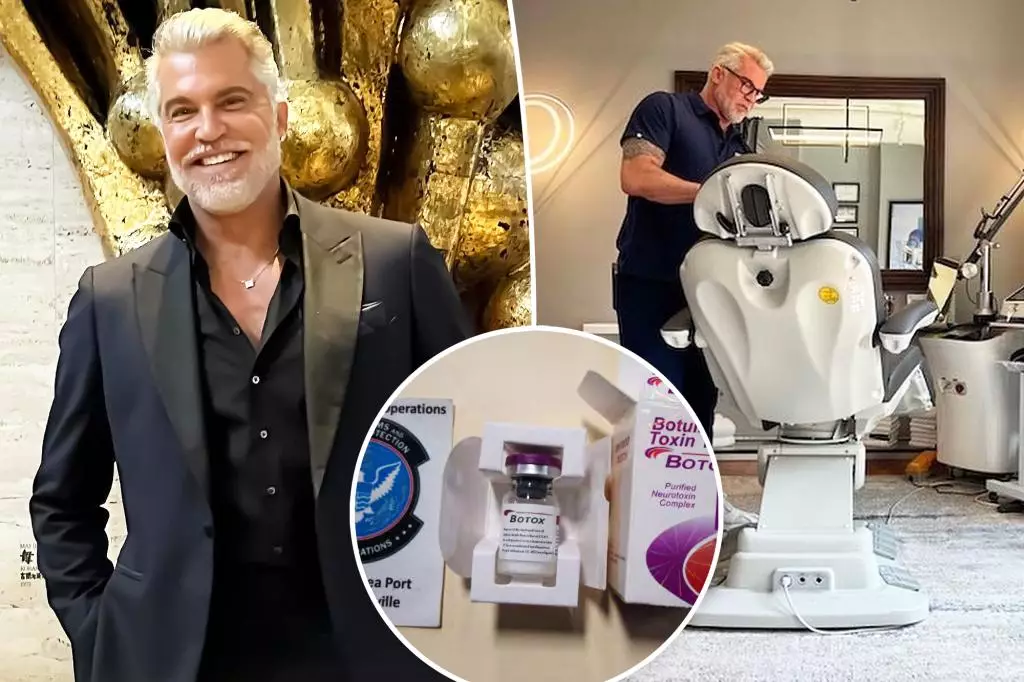In an era where physical appearance increasingly dictates social interactions, cosmetic procedures have surged in popularity. However, the recent case involving aesthetician Joey Grant Luther has exposed a shocking underbelly to the booming industry. Allegations against Luther suggest a disturbing betrayal of trust, as he is accused of injecting clients with counterfeit Botox sourced illegally from China. The fallout from his actions has not only endangered individual health but also raised alarm bells about the broader implications for the beauty and wellness industry.
Clients who sought Luther’s services were reportedly taken aback by the severity of their symptoms post-treatment. Reports detail numerous unsettling health issues, including double vision, difficulty swallowing, heart palpitations, and even slurred speech. These adverse effects underline the risks involved in the pursuit of beauty through unregulated channels, casting light on how desperate clients can sometimes overlook red flags in favor of affordability and convenience.
One aspect that makes Luther’s case particularly troubling is the attraction he held for his clients. With treatment prices that were significantly lower than his licensed counterparts—at just $300 for an area compared to rates that could easily exceed $600—Luther created a niche market that seemed appealing, particularly among the gay community, which constituted a significant portion of his clientele. The low-cost, high-demand services offered a false sense of security, leading clients to believe they were receiving safe treatments from someone personable and approachable. Unfortunately, many were unaware of the legal limitations on what Luther, as an unlicensed aesthetician, was permitted to perform.
The nature of counterfeit cosmetic products is complex and troubling. The FDA warns against the dangers of receiving unregulated treatments, emphasizing not only the health risks but also the potential for significant psychological trauma. In Luther’s case, one victim underwent extensive medical examinations and treatments, including CAT scans and MRIs, all to rectify the harm inflicted by what was supposed to be a beauty enhancement. Regrettably, the consequences of compromised safety standards will reverberate throughout the community as trust is eroded.
Legal authorities have stepped in to address the gravity of Luther’s alleged misconduct. He faces various charges, including wire fraud and smuggling in connection with the distribution of misbranded and counterfeit drugs. The U.S. Attorney’s Office has implicated him in a grand scheme that turns a supposedly glamorous profession into a nightmare for unsuspecting clients. Reports indicate that Luther’s medical spa, JGL Aesthetics, operated without the requisite licensing, and his actions could lead him to serve up to 20 years in prison if found guilty on the most serious charges.
Interestingly, despite the alarming nature of the charges, the situation has revealed a paradox: the strong demand for affordable aesthetic treatments sometimes outweighs the basic need for safety and legality. This demand fuels underground markets where individuals like Luther can operate outside of regulatory oversight, putting clients at risk. The arrests and subsequent investigations must serve as a clarion call for stronger regulations within the cosmetic industry, ensuring that safety standards are not just honored in the breach.
The aftermath of this scandal presents an essential discussion on the future of aesthetic treatments. If the beauty industry wishes to maintain its relevance, it must address the legitimate fears that clients now harbor. The importance of client education cannot be overstated; potential patients must be equipped with knowledge about the qualifications and licenses required for various aesthetic procedures. Moreover, establishing better checks and balances within the industry is critical to prevent similar occurrences.
A community reeling from betrayal may slowly rebuild trust, but it will require concerted efforts from industry professionals, regulatory bodies, and clients alike. By fostering transparency and adhering to ethical practices, the aesthetic world can hope to heal and regain the confidence of individuals who deserve safe, effective treatments without the specter of counterfeit products looming in the shadows.
